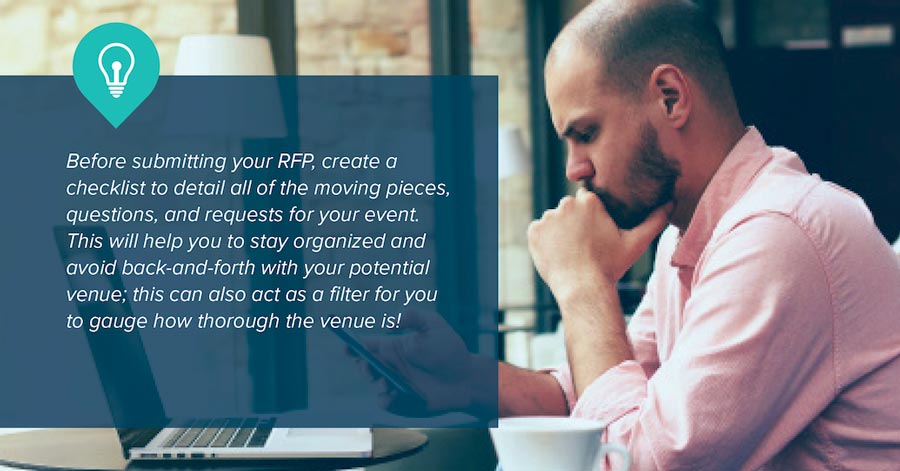It goes without saying that location is one of, if not the biggest consideration when organizing an event. 36% of event planners spend most of their budget on the venue, so finding the right event space involves more than just location. Before you commit to a venue, you want to ensure that not only the basics are covered (WiFi, in-house A/V, F&B options), but that the staff are willing to work with you – not against you.
Start out with your list of must-haves, nice-to-haves, and wish-list items, and find out if your potential venue is willing to work with you to make these a reality. Are they willing to negotiate rates with you? Are they quick to respond to you? These are your signals for what’s to come.
But don’t just rely on your first impression, do your research: check online forums, ask for recommendations or past experiences with your potential venue. Events are never a one-stop-shop, so be sure that you can trust your venue to be flexible to your needs.
The city, venue and scene set the tone for your event experience, so factoring logistics like rates and capacity is just the beginning.
Traditional vs. Non-Traditional Venues
While traditional event venues like hotels are still the top pick for the majority of event professionals, unique, non-traditional venues such as museums, theatres, and reclaimed warehouses are on the rise. Depending on the size of your event, the sky is the limit when it comes to creative conference destinations.
Don’t be afraid to stand-out and take risks, but don’t lose sight of those logistical concerns. Ensuring that a venue is appropriate for the size, content, and agenda of your event is essential before settling on a venue.
Factors to Consider:
- Does this venue have the seated and standing room capacity to host the number of intended guests?
- Is there an appropriate number of rooms for sessions, breaks, exhibitors, receptions, meals, etc?
- Does the venue meet the theme of your event?What are the available options for catering, audio/visual, etc?
- What are the fees involved?
- Are rooms soundproofed? Will there be any noise interference during sessions?
Accessibility
Picture it: A former textile warehouse-turned-event space in a trendy, up-and-coming neighborhood that’s not only unique and unusual, but it also ticks all your boxes for vendors, space, and budget. The only catch – even Google Maps can’t get you there in under an hour, and you’re a local. Just imagine what it will be like for someone who’s flown in from halfway across the country?
You’re guaranteed an unhappy attendee experience when the act of simply getting to your event each day involves anything that can be described as “a journey”, so be sure not to sacrifice accessibility when you’re considering your event venue.
Factors to consider:
- Is the venue in walking distance to a variety of hotels?
- Is the venue easy to access by car for those who will be driving to your event?
- Is the venue accessible for people with physical limitations?
- How far from the nearest airport or major transportation hub is the venue?
- Is there parking provided or available nearby? What are the parking rates?
Accommodation
If you are hosting a multi-day event, ensuring that your guests have options for where to stay is a must. Some people like to spend their downtime in their hotel rooms, while others might plan on arranging meetings or working lunches back at their hotel bar or restaurant.
Most major event venues will work with you on special rates for your guests at select hotels, but for smaller events or less traditional venues this might not be the case, so work with the hotels in the area to see if they can offer discounted rates and room blocks for your guests.
Factors to consider:
- Are there a variety of hotels within walking distance or a short cab ride from the venue?
- Is accommodation booked, managed and paid for by your event budget or are you looking for discounted rates for the attendee to book directly?
- Are there a variety of price points for your guests to choose from?
- Do any of the hotels offer parking?
Add-Ons
The last thing you want after you sign a contract with your venue is to find out that you’ll be charged for everything from WiFi to water. Find out in advance what packages are offered for all your tech and catering needs, as these could come back to haunt both your budget and your sanity.
Factors to Consider:
- Are there options for services, or is your only option the in-house standard services?
- Are you able to use your own designated vendors?
- What packages are offered for catering, activities, media, etc?
Once you’ve lined up the perfect location for your event, it’s time to get started on event flow. Stay tuned for part two of our series, Six Keys to Event Planning Success, Part 2: Event Flow for more on branding, registration, agenda and more!

